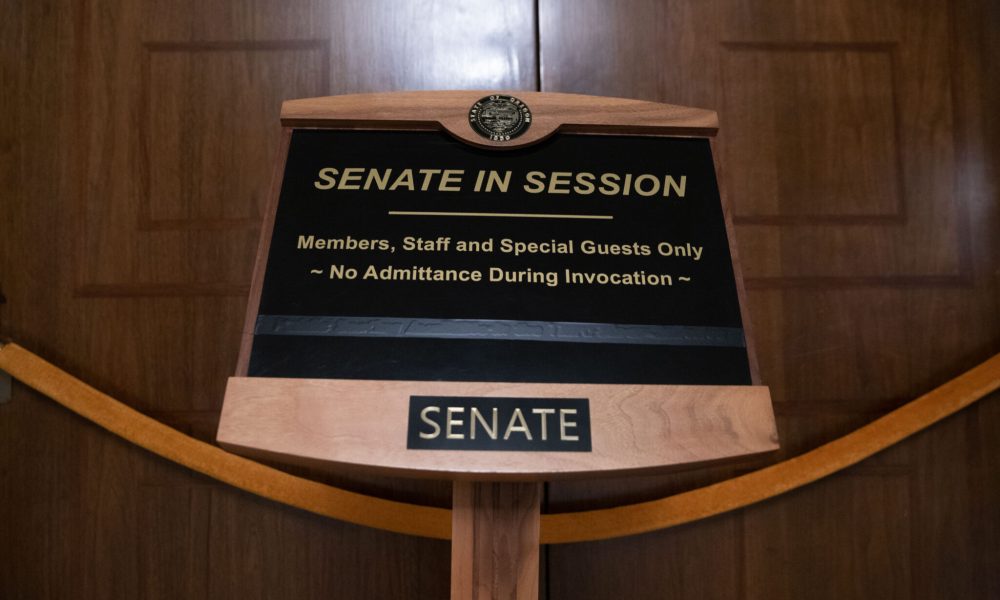Most Oregon Republican senators on Wednesday skipped the Senate’s floor session, bringing the upper chamber’s work to a halt without the required two-thirds quorum as they face votes on the most divisive issues of the session: reproductive health and gun control.
The walkout – which Republican leaders called a work stoppage – comes amid frustrations between minority GOP senators and Democratic leaders over contentious issues like firearms regulations, transgender rights and abortion. GOP leaders say the move is not tied to any one bill and aims to combat an unconstitutional process of passing bills that fail to meet legal requirements for readable language that the public can understand.
Senate Republican Leader Tim Knopp of Bend said Senate President Rob Wagner, D-Lake Oswego, has resisted efforts to correct the problem.
“He’s driving a very partisan and what we say is unlawful and unconstitutional Legislature,” Knopp said in an interview with the Capital Chronicle shortly after the Senate ended its meeting without conducting business. “He’s the one that can fix that. He can make it bipartisan. He can follow the law. He’s choosing not to. That is his fault, just because we react to try to defend democracy and defend transparency.”
Knopp and Sen. Dick Anderson of Lincoln City were the only GOP senators on the Senate floor when Wagner said the sergeant-at-arms could not locate members with unexcused absences. In all, 12 senators had excused or unexcused absences, leaving the body just two members shy of the required 20-member quorum.
Kotek: No plans to sent out state police
The move marks an escalation of Republican protests. Senate Republicans attempted to remove Wagner as Senate president on Tuesday and have insisted on reading bills in full, a slowdown tactic that has led to late nights.
This is the first walkout, a tactic Republicans used frequently in past sessions, and comes months after voters approved a constitutional amendment to prevent walkouts from grinding business to a halt. Any member with 10 unexcused absences cannot run for reelection under Measure 113, which was passed with a wide majority in November. Wagner dismissed the Republicans’ stated reason for the walkout.
“What we’ve seen today is that the excuse that we had from Republicans for missing today’s floor session (is) meritless,” Wagner told reporters. “The real reason that we see the walkout today is to show that people are obstructing the ability for senators to vote on reproductive freedom and sensible gun safety.”
Gov. Tina Kotek told the Capital Chronicle during a tour in eastern Oregon that she hopes legislators will “come back and do their job,” and that she plans to call Knopp as soon as she can.
“I’m going to be really upfront: We have public safety issues around the state,” she said. “I’m not sending out the Oregon State Police, if that’s the question.”
In a lengthy press conference after the aborted floor session, Knopp said he didn’t know whether the members of his caucus remained in Oregon. Republicans including Knopp fled the state during past walkouts.
He remained in the Senate because Republicans wanted him there as their spokesperson and leader, he said, but he didn’t rule out joining protesting Republicans at a later date.
Knopp said Republicans and an independent senator are taking their protest day-by-day, and that it’s possible at least one will rack up 10 unexcused absences to have legal standing to challenge the constitutionality of the new voter-approved law.
House Republicans didn’t join in the walkout. Knopp said he encouraged House Minority Leader Vikki Breese-Iverson, R-Prineville, to stay because the House’s rules aren’t as specific.
“We think the case, quite frankly, is stronger on the Senate side and wish to litigate it from this perspective,” he said.
For now, the ballot measure’s passage will not slow down unexcused absences, said Jim Moore, a political science professor at Pacific University.
”They’ve got nine more unexcused absences,” Moore said. “They still have as many lives as a cat. Right? So it shows the weakness of the law that we the people passed in November.”
Democratic leaders said the walkout is an attempt to stall a vote on House Bill 2002, a reproductive health bill.
“The people of Oregon are not fooled,” said Senate Majority Leader Kate Lieber, D-Beaverton. “It is no coincidence that the Republicans are employing these tactics just at the time that we were about to address House Bill 2002.”
The bill would shore up gender-affirming care in Oregon and further solidify abortion rights by protecting providers from lawsuits.
Two Republican legislators – Sen. Suzanne Weber, R-Tillamook and Rep Emily McIntire, R-Eagle Point – and the anti-abortion group Oregon Right to Life filed a related lawsuit in Marion County Circuit Court over House Bill 2002 on Wednesday, trying to block the bill from advancing because of its summary.

Communication breaks down
Knopp and Wagner have not talked to each other for about a month.
“He hasn’t talked to me in four weeks,” Knopp said, adding that includes no phone calls.
Knopp said both of them have canceled meetings at various points, and that it’s Wagner’s responsibility as Senate president to reach out.
Asked about the lack of discussions, Wagner said he’s disappointed.
“It’s disappointing to me that we haven’t had the opportunity or we haven’t been afforded the opportunity to sit down in advance of some of these – you know – parliamentary tricks that we’re seeing to actually talk about substantive issues,” Wagner said.
Knopp warned that much more is at stake.
“The Senate president is recklessly driving democracy into a ditch,” Knopp said. “I think he’s gone through the ditch and is headed for a cliff.”
His son and chief of staff, Reagan Knopp, set a shredder on a chair during the press conference, feeding in pieces of paper with “Democrats” printed in blue ink over the text of the Senate rule, state law and constitutional provision Knopp and others contend were violated.
The five senators with unexcused absences included four Republicans: Sens. Daniel Bonham of The Dalles, Lynn Findley of Vale, Cedric Hayden of Fall Creek and Dennis Linthicum of Klamath Falls. They were joined by Sen. Brian Boquist, I-Dallas. The seven excused absences included six Republicans and a Democratic lawmaker.
Sen. Bill Hansell, R-Athena, was excused for the tour with Kotek. He told the Capital Chronicle he supports the walkout and hopes to be counted as excused through Friday.
None of the other absent lawmakers returned calls or emails from the Capital Chronicle by early Wednesday evening.
Other Republicans, including Knopp, requested excused absences. Wagner denied those, and said he’ll consider requests for excused absences for a legitimate reason, such as health concerns or the loss of a family member.
But he said he won’t approve requests for absences that try to obstruct the Senate’s work
“There’s a bright line in terms of how we’re going to be treating those request forms in the future,” he said.
The unapproved request forms from senators told Wagner the Senate isn’t following the law and its actions are “an abdication of our duty and an affront to the people of Oregon.”
The senators also sought an excused absence due to a provision in the state constitution that gives legislators the “right to protest.”
“It is an exercise of my conscience and consistent with my oath of office,” the letters say.
Wagner adjourned the floor until 10:30 a.m. Thursday, though it’s unclear whether they will have the necessary quorum. “There’s a bright line in terms of how we’re going to be treating those request forms in the future,” he said.
The session must end no later than June 25.
Readability debate
Justin Brecht, a senior policy analyst for the Senate Republican caucus, alerted Knopp to the readability rule in mid-April, Knopp said. Brecht did more research into a 1979 law requiring every bill summary to be written at the equivalent of a middle-school reading level.
The law specifically refers to the Flesch test, named for an Associated Press consultant in the 1940s, Rudolf Flesch. He created it as a tool for newspapers, and it’s still used to gauge the complexity of a piece of writing.
The scale runs from 0 to 100, with lower scores representing writing that could only be understood by a university graduate. State law requires summaries to have a score of 60 or above, meaning they could be understood by someone with a middle-school education.
A Senate rule says every summary must comply with that law. The state constitution doesn’t require a readability test, but it does require that all laws are “plainly worded.”
“If you look at the measure summaries right now, they’re actually pretty hard to read,” Brecht said. “The whole point of when the statute was passed was so that the public could better understand what laws are being passed here.”
Differing legal opinions
Democrats cited a legal opinion from Dexter Johnson, the Legislature’s top lawyer, though they later declined to share that opinion because of the lawsuit.
The Capital Chronicle obtained the opinion through other means. Johnson cited a 2020 Oregon Supreme Court ruling, City of Damascus v. State of Oregon that found that a measure summary failing to comply with the state law isn’t enough to declare a bill invalid.
Johnson said legislative custom plays a large role in determining what’s allowed in the Senate.
“The overwhelming majority of enacted legislative measures have not scored a Flesch readability test of 60 or greater,” he wrote. “Accordingly, the custom, usage and precedent of the Senate is that Flesch readability test scores of measure summaries are not considered in determining whether to enact a measure.”
Knopp obtained his own legal opinion from an attorney and former Republican state Rep. Michael McLane. In a six-page opinion, McLane advised Knopp that the Senate was violating a Senate rule, a state law and the spirit of the Oregon Constitution.
McLane noted that it’s easy to check whether summaries meet the readability standard in state law, with online calculators where anyone can copy and paste text.
“I have done that for quite a few bills and must report that I have yet to find a measure summary that complies with the law,” McLane wrote.
For now, Knopp and other Republicans realize their options are limited as they advocate for the Senate to slow down.
“Somebody needs to tap the brakes, and that’s what we’re saying: ‘We need to tap the brakes,’” Knopp said. “I think the majority would prefer that we be a speed bump.”
–Capital Chronicle reporter Alex Baumhardt contributed reporting.
Oregon Capital Chronicle is part of States Newsroom, a network of news bureaus supported by grants and a coalition of donors as a 501c(3) public charity. Oregon Capital Chronicle maintains editorial independence. Contact Editor Lynne Terry for questions: info@oregoncapital




